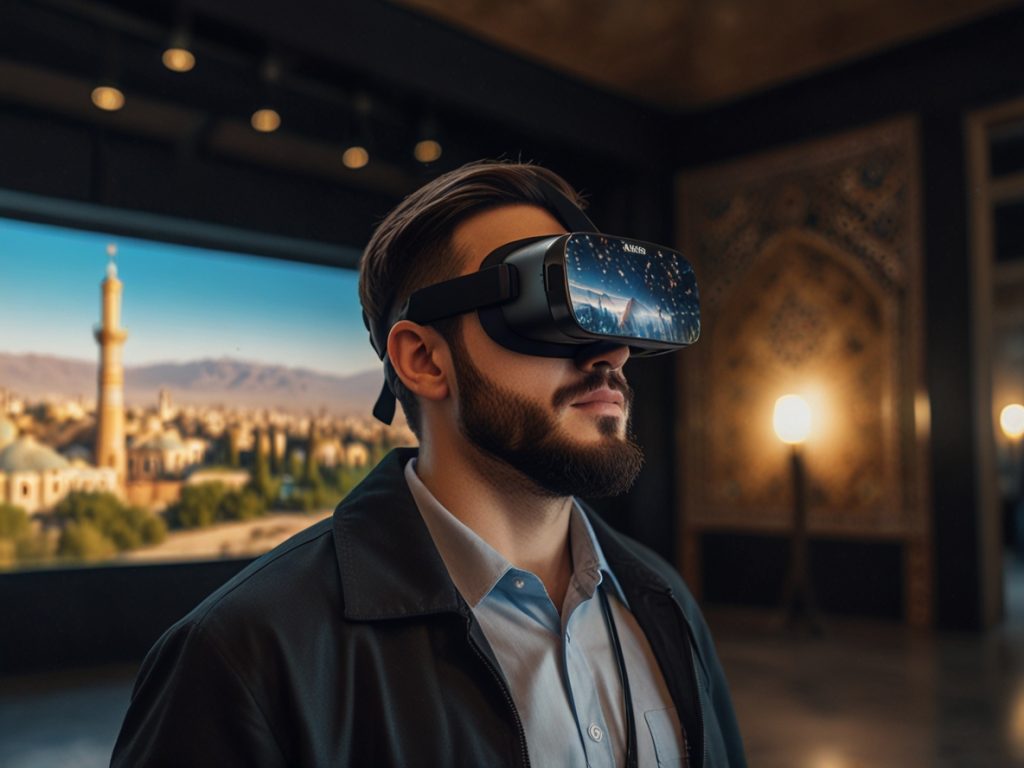- Introduction
- Definition of the metaverse, virtual travel, and the significance and growth of related technologies
- History and Concept of the Metaverse
- Origins and history of the metaverse
- Prominent platforms in the metaverse
- Virtual Travel in the Metaverse
- Definition and features of virtual travel
- Differences from real travel, tools, and technologies used (VR and AR)
- Advantages of Virtual Travel in the Metaverse
- Cost reduction
- Accessibility for everyone
- Environmental conservation
- Challenges of Virtual Travel in the Metaverse
- Technological limitations
- Cultural and social issues
- Data security and privacy
- The Role of the Metaverse in the Future of Tourism
- The impact of the metaverse on travel, traditional tourism, and examples of platforms providing virtual tourism experiences
- Conclusion
- The future outlook for virtual travel and the metaverse
Introduction
- Definition of the metaverse, virtual travel, and the significance and growth of related technologies
In recent decades, there have been significant advancements in technology, and one of the most innovative among them is the emergence of the metaverse. The metaverse, known as an interactive digital world, is becoming a platform where people can have various experiences, such as shopping, education, and even virtual travel. With the development of Virtual Reality (VR) and Augmented Reality (AR) technologies, the idea of traveling to different parts of the world without physical movement is rapidly becoming a reality. This article explores the concept of the metaverse and its role in transforming virtual travel.

History and Concept of the Metaverse
- Origins and History of the Metaverse
The concept of the metaverse was first introduced in the 1992 science fiction novel *Snow Crash* by Neal Stephenson. In this novel, the metaverse was described as a virtual world parallel to the real world, where people could interact through their avatars. However, with the advancement of digital technologies, particularly blockchain, artificial intelligence, and virtual reality, this concept has turned into a practical phenomenon.
- Prominent Platforms in the Metaverse
Platforms like Decentraland, The Sandbox, and especially ALFANOVA allow users to purchase virtual real estate and engage in various virtual experiences. These technologies have gradually become tools for conducting virtual travel, enabling users to visit attractions worldwide without leaving their homes.

Virtual Travel in the Metaverse
- Definition and Features of Virtual Travel
Virtual travel is defined as an experience made possible through digital technologies, allowing users to explore real or imagined geographic locations.
- Differences from Real Travel, Tools, and Technologies Used (VR and AR)
In the metaverse, virtual travel goes a step further, as individuals can visit different parts of the world—even impossible locations like other planets or historical times—through their avatars.
By using technologies such as VR headsets, people can become fully immersed in digital environments. These experiences enable users to visit beautiful landscapes, historical monuments, or pristine nature without needing to leave their homes. One of the notable features of virtual travel in the metaverse is that the experiences are designed to be interactive and multisensory, providing users with a sense of actual presence in that environment. A prominent platform in this area is ALFANOVA Metaverse, which allows users to travel in environments based on reality or designed fantasy worlds. Using VR and AR, ALFANOVA offers interactive and exciting travel experiences. Users can visit historical landmarks, travel to other planets, or even journey to the past or future. The platform also allows companies and organizations to design virtual tours and provide users with unique travel experiences.

Advantages of Virtual Travel in the Metaverse
Virtual travel in the metaverse offers numerous advantages that can serve as a suitable alternative to traditional travel.
- Cost Reduction
One of the biggest advantages of virtual travel is the significant reduction in costs. For traveling to popular destinations worldwide, substantial expenses are usually needed for plane tickets, hotels, and other costs. However, in the metaverse, these costs are almost zero.
- Accessibility for Everyone
Virtual travel allows individuals, regardless of their economic or physical situation, to access different parts of the world. Those who cannot travel due to physical disability or other limitations can use the metaverse to visit places they’ve always dreamed of.
- Environmental Conservation
Considering the environmental impact of physical travel on nature, including greenhouse gas emissions from air transportation, virtual travel can be a green and sustainable alternative. This type of travel causes no harm to the environment and can make a significant contribution to reducing the carbon footprint.

Challenges of Virtual Travel in the Metaverse
Despite all the advantages, virtual travel also faces challenges, including the following
- Technological Limitations
Many of the technologies needed to provide truly immersive experiences have yet to be sufficiently developed. Issues like data transmission delays, low image resolution, and the need for expensive hardware are among the current limitations in this field.
- Cultural and Social Issues
Virtual experiences cannot fully recreate all the cultural and social aspects of a real place. For example, meeting local people, experiencing local foods, and participating in real cultural events are elements that are not yet entirely possible in the virtual world.
- Data Security and Privacy
Entering virtual worlds involves risks related to user privacy and data security. Protecting users’ data in digital environments is one of the greatest challenges facing the metaverse.

The Role of the Metaverse in the Future of Tourism
- Impact of the Metaverse on Travel, Traditional Tourism, and Examples of Platforms Providing Virtual Tourism Experiences
The metaverse, as an emerging technology, has significant potential to reshape the landscape of the tourism industry. Traditional tourism companies may use metaverse platforms to provide new experiences for their customers. Some major tourism companies are already exploring how they can use the opportunities offered by the metaverse to expand their services. A prominent platform in this area is ALFANOVA Metaverse, which enables virtual travel to tourist and historical sites. In ALFANOVA, tourism companies can use the platform’s advanced capabilities to create virtual tours and provide their customers with an unparalleled experience of traveling around the world. With the use of ALFANOVA Metaverse, not only is it possible to visit famous places globally, but users can also travel to locations that are inaccessible in the real world. The platform allows users to immerse themselves in interactive environments through their avatars, gaining unforgettable virtual travel experiences.
Conclusion
- Future Outlook for Virtual Travel and the Metaverse
This article has explored the metaverse and its role in transforming virtual travel. By utilizing technologies like VR and AR, the metaverse makes it possible for individuals to travel virtually to various parts of the world and have unique experiences. Although challenges such as technological limitations and security issues remain, the future of the metaverse as an influential tool in the tourism industry appears promising. With further advancements in this field, virtual travel could become one of the most popular and sustainable ways to explore the world.
Table of Contents
Toggle

